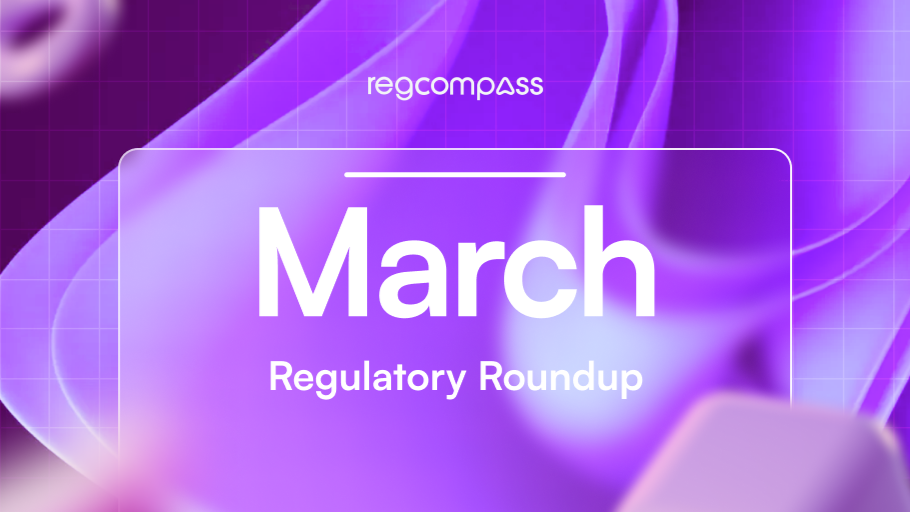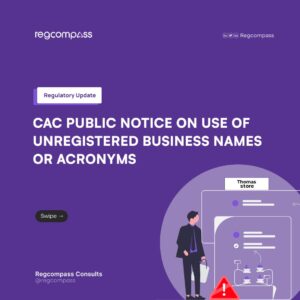March Regulatory Roundup 2025
Welcome to the March regulatory round up. We provide you with the latest regulatory news and insights across Nigeria, Africa and beyond. Let’s dive into a thoughtful and comprehensive update on recent developments.
Regulatory update in Nigeria
- SEC warns against unregistered investment schemes
- SEC directs CMOs to pay 2024 CCCOCIN annual dues
- Name and Shame’ policy introduced by SEC
- Reps to consider reports of tax reform bills
- NDPC Issues NDPA General Application and Implementation Directive
- Tinubu signs Investment and Securities Act into Law
- CBN Enhances Oversight to Protect Nigeria’s Financial System
- FATF’s Revised 40 Recommendations
- Trademark Class Filing: Zap v Zap Africa
Across Africa: Welcoming Innovation While Addressing Challenges
- Ripple Teams Up With Chipper Cash.
- Foreign digital lenders give Kenya a conundrum
- Flutterwave Expands Payment Services in Ghana
- Ghana and Rwanda Advance Fintech Licence Passporting
Across the World:
- Atoa Payments Secures FCA Authorisation.
- Cashflows Facilitates Mswipe UK Expansion to Improve Business Payment
- FCA Seeks Industry Feedback on Removing £100 Contactless Payment Limit
- Australian Government to Regulate Buy Now, Pay Later Industry as Credit Products
- UAE Central Bank Sanctions Five Banks for Tax Compliance Violations
- Update on Clients with UK Entities
- FRA Approves Digital Onboarding Across Egypt.
Crypto Scoop:
- Binance ends Tether USDT trading in Europe
- FDIC Clears Path for Bank Crypto Activities Without Prior Approval
- U.S Government removes Tornado Cash sanctions.
- Pakistan aims to legalise Bitcoin and crypto
- SEC to drop lawsuit against Ripple
Deals and Raises:
- Nigeria Clean Energy Financing Startup, Payhippo, Raises $4 million in Pre-Series A Funding, Rebrands as Rivy
- Solace Commences Series B Funding Round, Set to be Valued at $300 million
- NITDA partners Dubai firm to create remote job opportunities for Nigerian tech talents
Mergers and Acquisitions
- TAJ bank to raise N20 billion to strengthen capital base

Regulatory update in Nigeria
SEC warns against unregistered investment schemes
The SEC notice provides important safeguards against possible financial fraud. In an effort to protect investors from large financial losses, the SEC is actively exposing unregistered schemes such as Pro-Vest and My Share. A safer investment environment is promoted by this proactive approach, which upholds the integrity of the Nigerian capital market.
SEC directs CMOs to pay 2024 CCCOCIN annual dues
The Securities and Exchange Commission(SEC) is actively pushing for greater compliance within the capital market by reminding Chief Executive Officers of Capital Market Operators (CMOs) of their obligation to register their Compliance Officers with the Chartered Council of Compliance Officers of Nigeria (CCCOCIN) and promptly pay annual dues. This directive following up on a previous communication, signals the SEC’s commitment to strengthening the CCCOCIN’s role in improving regulatory adherence, as evidenced by the current low compliance level.The SEC urges CMOs to clear 2024 dues and pay 2025 fees early, reinforcing efforts to boost market integrity and investor confidence, including naming non-compliant operators.
Name and Shame’ policy introduced by SEC
The Nigerian SEC has launched a “name and shame” policy targeting capital market operators (CMOs) who flout regulatory obligations. This public disclosure approach not only tarnishes the reputation of erring firms but also signals potential loss of investor trust, suspension of market activities, and disqualification from future regulatory approvals. By listing defaulters in its official journal, the SEC is reinforcing accountability, leveraging reputational risk as a powerful enforcement tool, and signaling that regulatory non-compliance now comes with both public and commercial consequences.
Reps to consider reports of tax reform bills
The House of Representative began a clause-by-clause review of the tax reform bill reports. This follows a three-day public hearing and the review of memoranda and stakeholder inputs. Among the reports presented is a bill aimed at regulating tax assessment, collection, and revenue accounting for all tiers of government while defining the powers and functions of tax authorities. While this development could translate into a more predictable business environment, potentially reducing compliance burdens and fostering economic stability. It is definitely crucial for businesses to monitor the legislative process.
NDPC Issues NDPA General Application and Implementation Directive
The Nigeria Data Protection Commission (NDPC) has issued the General Application and Implementation Directive 2025 (GAID), providing a clear framework for enforcing the Nigeria Data Protection Act 2023 (NDPA), which replaces the NDPR. GAID mandates annual compliance audits, registration for major data controllers/processors, and extends the NDPA’s scope to Nigerians abroad—enhancing data governance, accountability, and global alignment.
Tinubu signs Investment and Securities Act into Law
President Bola Ahmed Tinubu’s signing of the Investment and Securities Act (ISA) 2025 marks a transformative moment for Nigeria’s capital market, signaling a robust commitment to modernizing and strengthening the nation’s financial framework.This offers important advantages and safeguards, because a more safe investing environment results from the Act’s emphasis on improving investor protection and market transparency,which lowers the risk of financial frauds and Ponzi schemes that have historically afflicted the market.Additionally, the strengthened regulatory framework empowers the SEC to enforce compliance and maintain market stability, fostering a more credible and resilient capital market for businesses in long-term financial growth and security.
CBN Enhances Oversight to Protect Nigeria’s Financial System
The Central Bank of Nigeria (CBN) has reaffirmed its commitment to a transparent and resilient financial system, urging financial institutions to align with international standards for risk management and regulatory compliance particularly in Anti-Money Laundering (AML) and Countering the Financing of Terrorism (CFT). At a high-level training that was held, the CBN and Citi representatives emphasized the need for dynamic, risk-based AML/CFT programs, proactive regulatory engagement and strong governance frameworks including (KYC, KYB and KYT )protocols. These efforts support the CBN Governor’s vision of regulatory excellence and enhanced trust in Nigeria’s financial ecosystem.
FATF’s Revised 40 Recommendations
The Financial Action Task Force (FATF) has introduced pivotal updates to its 40 Recommendations, signaling a shift from procedural compliance to outcome-driven risk management. Two changes are especially noteworthy: supervisors are now required to assess the effectiveness of risk mitigation measures, not just their existence, and non-face-to-face (NFTF) relationships are no longer automatically high-risk if strong controls are in place. For businesses, this means rethinking compliance strategies moving away from box-ticking toward demonstrable, risk-responsive frameworks. Effective system controls, customer authentication, and platform governance will now define regulatory confidence, opening the door to more nuanced risk ratings and potential cost savings.
Trademark Class Filing: Zap v Zap Africa
The trademark clash between Zap Africa and Paystack serves as a timely warning for startups and tech companies that filing a trademark is not enough but filing it in the right class is critical. Zap Africa’s registration under Class 35 (business services) didn’t shield it from Paystack’s “Zap” app in Class 36 (financial services), exposing a gap in protection. This highlights a core truth misaligned trademark filings can leave your brand legally vulnerable, no matter how early you register. For founders, it’s a reminder that trademark strategy isn’t just legal housekeeping, it’s brand survival.

ACROSS AFRICA
Ripple Teams Up With Chipper Cash.
In order to facilitate cross-border payments into Africa, digital financial service providers Chipper Cash and Ripple have partnered to introduce blockchain technology through Ripple Payments. This departure from traditional methods promises much faster and cheaper international transfers, potentially increasing financial inclusion and reducing friction for individuals and businesses across Chipper Cash’s network users in nine African countries.This alliance offers more convenience and accessibility for remittances and international trade by enabling 24/7 global transfers.
Foreign digital lenders give Kenya a conundrum
Kenya is facing increasing regulatory pressure from foreign digital lenders that continue to violate its Data Protection Act, exploiting the lack of an international framework for cross-border data privacy enforcement. With nearly one-third of consumer complaints in the last fiscal year linked to the financial sector, primarily digital lenders,the Data Protection Commission is now pursuing mutual legal assistance to block non-compliant apps. The absence of global protocols for data protection, unlike those for money laundering or cybercrime, leaves significant enforcement gaps and complicates efforts to hold foreign platforms accountable for borrower data misuse.
Flutterwave Expands Payment Services in Ghana
Flutterwave, a leading African payments technology company, has expanded its operations in Ghana by launching the “Pay with Bank Transfer” service, in partnership with Affinity Bank. This initiative enables Ghanaian businesses to receive payments seamlessly through bank transfers, a method that recorded over 115 million transactions in 2023. While mobile money remains dominant, the rise of bank transfers reflects a shift in Ghana’s payment ecosystem. This development aligns with Flutterwave’s mission to simplify payments across Africa and follows its recent approval by the Bank of Ghana to provide inward remittance services
Ghana and Rwanda Advance Fintech Licence Passporting
Ghana and Rwanda have signed a landmark agreement to implement a fintech licence passporting framework, allowing licensed fintechs in either country to operate seamlessly across both jurisdictions. This initiative also includes plans for interoperable cross-border payment systems. Beyond regulatory efficiency, this marks a shift toward a more unified African fintech landscape reducing market entry friction, encouraging regional scaling, and setting a precedent for broader regulatory harmonization across the continent. For fintechs, it signals a future where regional expansion could become faster, cheaper, and more predictable.

Across the World:
Atoa Payments Secures FCA Authorisation.
Atoa Payments, a UK-based company specializing in open banking-enabled payment solutions, has achieved a significant regulatory milestone by securing authorization from the Financial Conduct Authority (FCA) to operate as an Authorised Payment Institution. This approval empowers Atoa to expand its service offerings to larger businesses across the UK, now including payment initiation, virtual account services, and payment account information services. This demonstrates to fintech companies how open banking has the ability to upend established payment methods by providing significant cost reductions and quicker transaction speeds. In the end, this action promotes the adoption of more effective and client-focused financial services by stimulating additional investment and development in open banking technologies.
Cashflows Facilitates Mswipe UK Expansion to Improve Business Payment
By using Cashflows’ BIN sponsorship and regulatory framework, Mswipe can efficiently enter the UK market, avoiding direct scheme membership and complex compliance hurdles. This accelerates market entry, cuts costs, and allows Mswipe to operate as a full acquirer with its existing technology. This provides a simplified route for fintechs to grow internationally, encouraging innovation and development in the payments sector by democratizing access to new markets and lowering the administrative costs usually involved in such growth.
FCA Seeks Industry Feedback on Removing £100 Contactless Payment Limit
Removing the contactless payment cap carries significant implications for companies, alongside clear advantages. Greater transaction flexibility could boost sales and enhance customer convenience, particularly for higher-value purchases that may drive economic growth. Financial institutions would also be better positioned to develop innovative payment solutions and implement advanced fraud detection technologies, leading to safer and more efficient transactions. However, strong fraud protection measures will be critical to support this transition.
UAE Central Bank Sanctions Five Banks for Tax Compliance Violations
The Central Bank of the UAE’s recent imposition of substantial financial penalties on several banks and insurance companies highlights the increasing regulatory pressure on fintech and financial institutions to ensure stringent tax compliance. For fintech companies and all businesses generally, this serves as a stark reminder that robust due diligence processes and accurate financial reporting are not optional but mandatory, as regulators actively work to combat tax evasion and maintain transparency.
Update on Clients with UK Entities
UK Companies House has introduced major reforms to boost transparency and combat economic crime, with this Stricter ID checks will apply to company formation and management, with third-party verifiers registered as Authorized Corporate Service Providers ACSPs. These changes aim to reduce fraud, increase accountability, and build trust in UK business data.
FRA Approves Digital Onboarding Across Egypt.
This signifies a regulatory evolution allowing fintech companies like mylo to leverage technology for remote customer onboarding, account activation, and instant credit access. The approval eliminates previous barriers, enabling faster and more convenient financial service delivery, which is particularly significant as mylo expands its reach across Egypt, indicating a regulatory environment increasingly supportive of digital financial inclusion.

Crypto Scoop:
Binance ends Tether USDT trading in Europe
Binance has ceased providing spot trading pairs for Tether’s USDt and other non-compliant tokens within the European Economic Area (EEA), this is due to the European Union’s Markets in Crypto-Assets (MiCA) law. These tokens can still be held on Binance and traded in perpetual contracts by users in the EEA and ESMA also guarantees that custody and transfer services for stablecoins that do not comply with MiCA do not contravene the recently enacted European cryptocurrency regulations.
FDIC Clears Path for Bank Crypto Activities Without Prior Approval
Reversal of the 2022 policy as the FDIC now permits banks under its supervision to participate in legally permitted cryptocurrency and blockchain related activities without obtaining prior approval, so long as they properly manage the risks involved. This is a big step for banking and cryptocurrency advocates as it aims in fostering innovation and capital flow, FDIC emphasizes that banks remain responsible for managing risks like market volatility, cybersecurity and AML obligations.
U.S Government removes Tornado Cash sanctions.
The U.S. Treasury Department has reversed its sanctions on Tornado Cash and removed over 100 associated Ethereum addresses from its SDN list. This came into light after the court ruled that OFAC overstepped its authority by sanctioning immutable smart contracts lacking a controlling party.
Pakistan aims to legalise Bitcoin and crypto
Pakistan’s government plans to establish a clear regulatory framework and possibly create regulatory sandboxes for startups as part of its strategic move to legalize cryptocurrencies in order to attract foreign investment and promote innovation in the digital finance space. The government aims to make Pakistan a blockchain finance leader, leverage low costs to rival crypto hubs and align with the global shift toward digital assets for growth.
SEC to drop lawsuit against Ripple
After four years of litigation, the SEC has formally dropped its long-running case alleging unregistered XRP sales. The ongoing appeals process is void due to this dismissal, which comes after a partial Ripple victory in July 2023 and the SEC’s subsequent appeal in January 2025. The judge ruled that XRP itself wasn’t a security but institutional sales were. The news caused XRP’s price to rise and was seen as a potentially influential legal precedent for the crypto industry.

Deals and Raises:
- Nigeria Clean Energy Financing Startup, Payhippo, Raises $4 million in Pre-Series A Funding, Rebrands as Rivy
- Solace Commences Series B Funding Round, Set to be Valued at $300 million
- Ghana’s Affinity Africa Secures $8M to Expand Digital Banking Services

Mergers and Acquisitions
- TAJ bank to raise N20 billion to strengthen capital base




